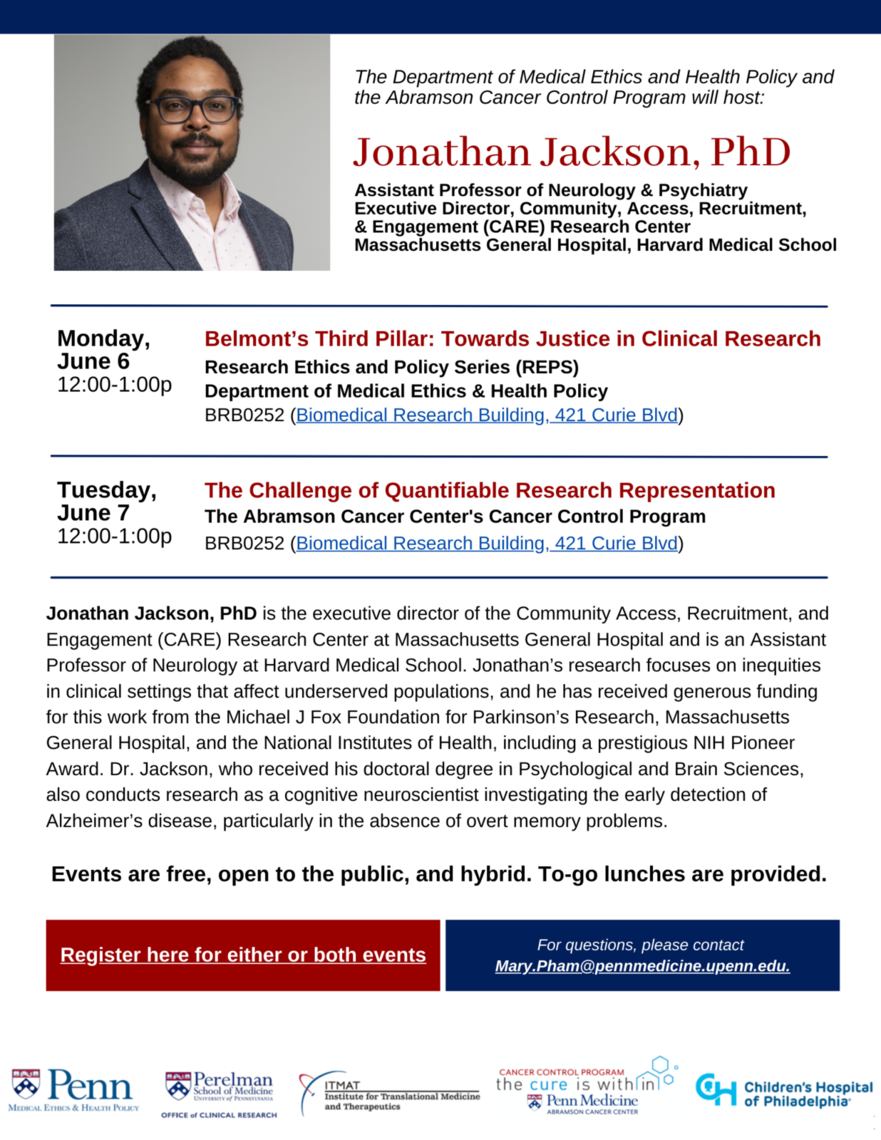Research Ethics and Policy Series & Abramson Cancer Center hosts: Jonathan Jackson, PhD
12:00pm - 1:00pm • Hybrid: Biomedical Research Building - BRB 0252 Seminar Rm (421 Curie Blvd)
2022-06-06 12:00:00 2022-06-07 13:00:00 America/New_York Research Ethics and Policy Series & Abramson Cancer Center hosts: Jonathan Jackson, PhD Monday, June 6 - Hosted by The department of Medical Ethics Belmont’s Third Pillar: Towards Justice in Clinical Research Tuesday, June 7 - Hosted by the Abramson Cancer Control Program The Challenge of Quantifiable Research Representation Time: 12:00-1:00p Eastern Location: BRB 0252 Seminar Rm (Biomedical Research Building - 421 Curie Blvd) HYBRID! Both events are in-person and via Zoom. To-go lunches are provided to in-person attendees. Bio: Jonathan Jackson, PhD, is the executive director of the Community Access, Recruitment, and Engagement (CARE) Research Center at Massachusetts General Hospital and is an Assistant Professor of Neurology at Harvard Medical School. CARE investigates the impact of diversity and inclusion on the quality of human subjects research and leverages deep community entrenchment to build trust and overcome barriers to clinical trial participation. Jonathan’s research focuses on inequities in clinical settings that affect underserved populations, and he has received generous funding for this work from the Michael J Fox Foundation for Parkinson’s Research, Massachusetts General Hospital, and the National Institutes of Health, including a prestigious NIH Pioneer Award to advance this work. Dr. Jackson, who received his doctoral degree in Psychological and Brain Sciences in 2014, also conducts research as a cognitive neuroscientist investigating the early detection of Alzheimer’s disease, particularly in the absence of overt memory problems. He has become a well-known representative to underserved communities and dozens of affiliated organizations, especially regarding participation in clinical research. Dr. Jackson serves in an advisory capacity for several organizations focused on equity in clinical research, and has written guidance for local, statewide, national, and federal organizations on research access, engagement, and recruitment. ------------ What to expect during the lecture: In-person participants: We are following the University of Pennsylvania’s COVID-19 guidelines. All in-person attendees are encouraged to wear masks and must either show their Green PennOpen Pass (University of Pennsylvania faculty, students, postdocs, and staff or badged contractors) OR Green PennOpen Campus (all other visitors including event attendees) in order to take part in-person. Attendees must complete their screening on their cell phones or computers BEFORE arriving at the venue. Click here for more information about PennOpen Campus and how it works. To-go boxed lunches will be provided to in-person participants, to be eaten after the lecture. Virtual participants: You will enter the virtual "waiting room" and will be admitted at noon Eastern. Your audio and video will be automatically muted upon entry and you will stay muted during the talk. You can submit questions to the chat box and a staff member will read it out-loud either during the talk or during the Q&A portion at the end. ------------ Information: Mary Pham, Mary.Pham@pennmedicine.upenn.edu Hybrid: Biomedical Research Building - BRB 0252 Seminar Rm (421 Curie Blvd) Penn Medical EthicsMonday, June 6 - Hosted by The department of Medical Ethics
Belmont’s Third Pillar: Towards Justice in Clinical Research
Tuesday, June 7 - Hosted by the Abramson Cancer Control Program
The Challenge of Quantifiable Research Representation
-
Time: 12:00-1:00p Eastern
-
Location: BRB 0252 Seminar Rm (Biomedical Research Building - 421 Curie Blvd)
-
HYBRID! Both events are in-person and via Zoom.
-
To-go lunches are provided to in-person attendees.
Bio: Jonathan Jackson, PhD, is the executive director of the Community Access, Recruitment, and Engagement (CARE) Research Center at Massachusetts General Hospital and is an Assistant Professor of Neurology at Harvard Medical School. CARE investigates the impact of diversity and inclusion on the quality of human subjects research and leverages deep community entrenchment to build trust and overcome barriers to clinical trial participation. Jonathan’s research focuses on inequities in clinical settings that affect underserved populations, and he has received generous funding for this work from the Michael J Fox Foundation for Parkinson’s Research, Massachusetts General Hospital, and the National Institutes of Health, including a prestigious NIH Pioneer Award to advance this work. Dr. Jackson, who received his doctoral degree in Psychological and Brain Sciences in 2014, also conducts research as a cognitive neuroscientist investigating the early detection of Alzheimer’s disease, particularly in the absence of overt memory problems. He has become a well-known representative to underserved communities and dozens of affiliated organizations, especially regarding participation in clinical research. Dr. Jackson serves in an advisory capacity for several organizations focused on equity in clinical research, and has written guidance for local, statewide, national, and federal organizations on research access, engagement, and recruitment.
------------
What to expect during the lecture:
In-person participants: We are following the University of Pennsylvania’s COVID-19 guidelines. All in-person attendees are encouraged to wear masks and must either show their Green PennOpen Pass (University of Pennsylvania faculty, students, postdocs, and staff or badged contractors) OR Green PennOpen Campus (all other visitors including event attendees) in order to take part in-person. Attendees must complete their screening on their cell phones or computers BEFORE arriving at the venue. Click here for more information about PennOpen Campus and how it works. To-go boxed lunches will be provided to in-person participants, to be eaten after the lecture.
Virtual participants: You will enter the virtual "waiting room" and will be admitted at noon Eastern. Your audio and video will be automatically muted upon entry and you will stay muted during the talk. You can submit questions to the chat box and a staff member will read it out-loud either during the talk or during the Q&A portion at the end.
------------
Information: Mary Pham, Mary.Pham@pennmedicine.upenn.edu
